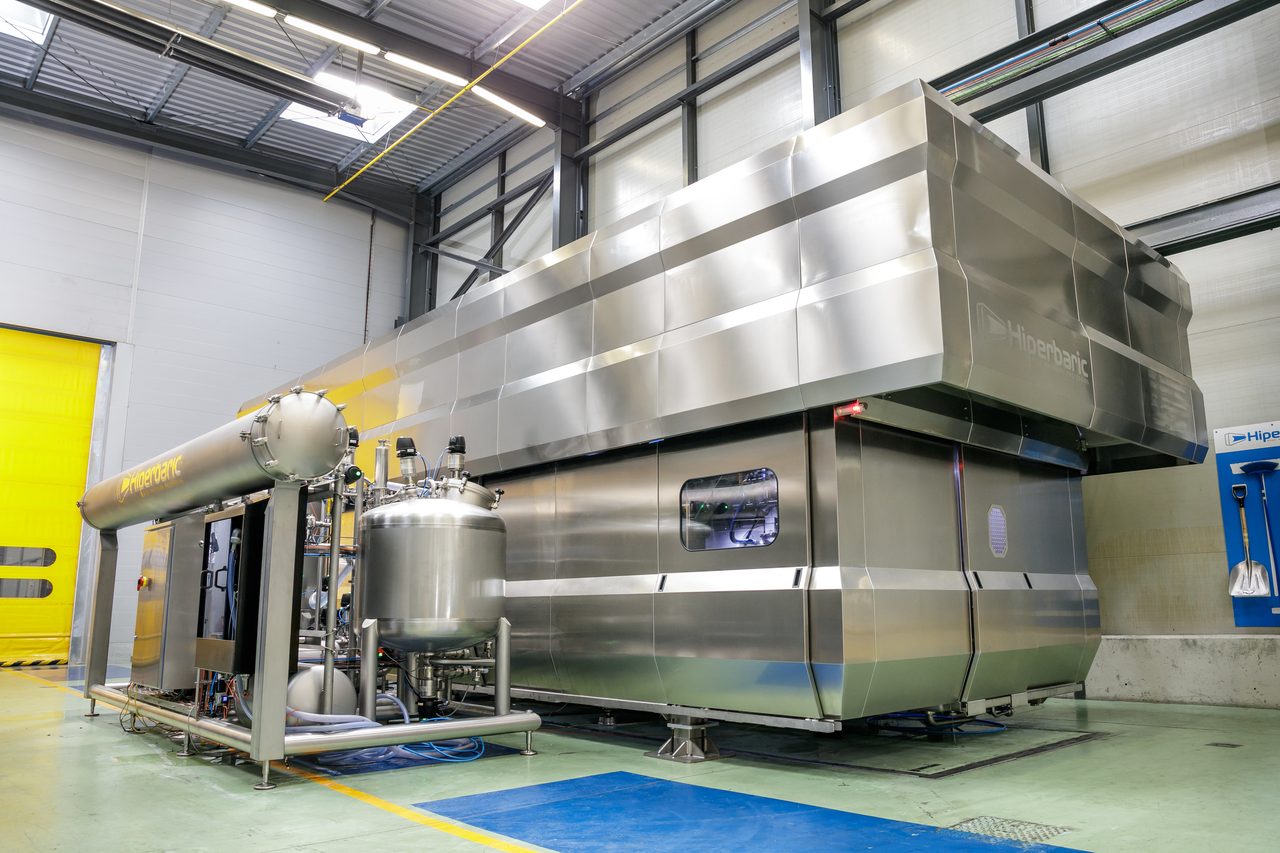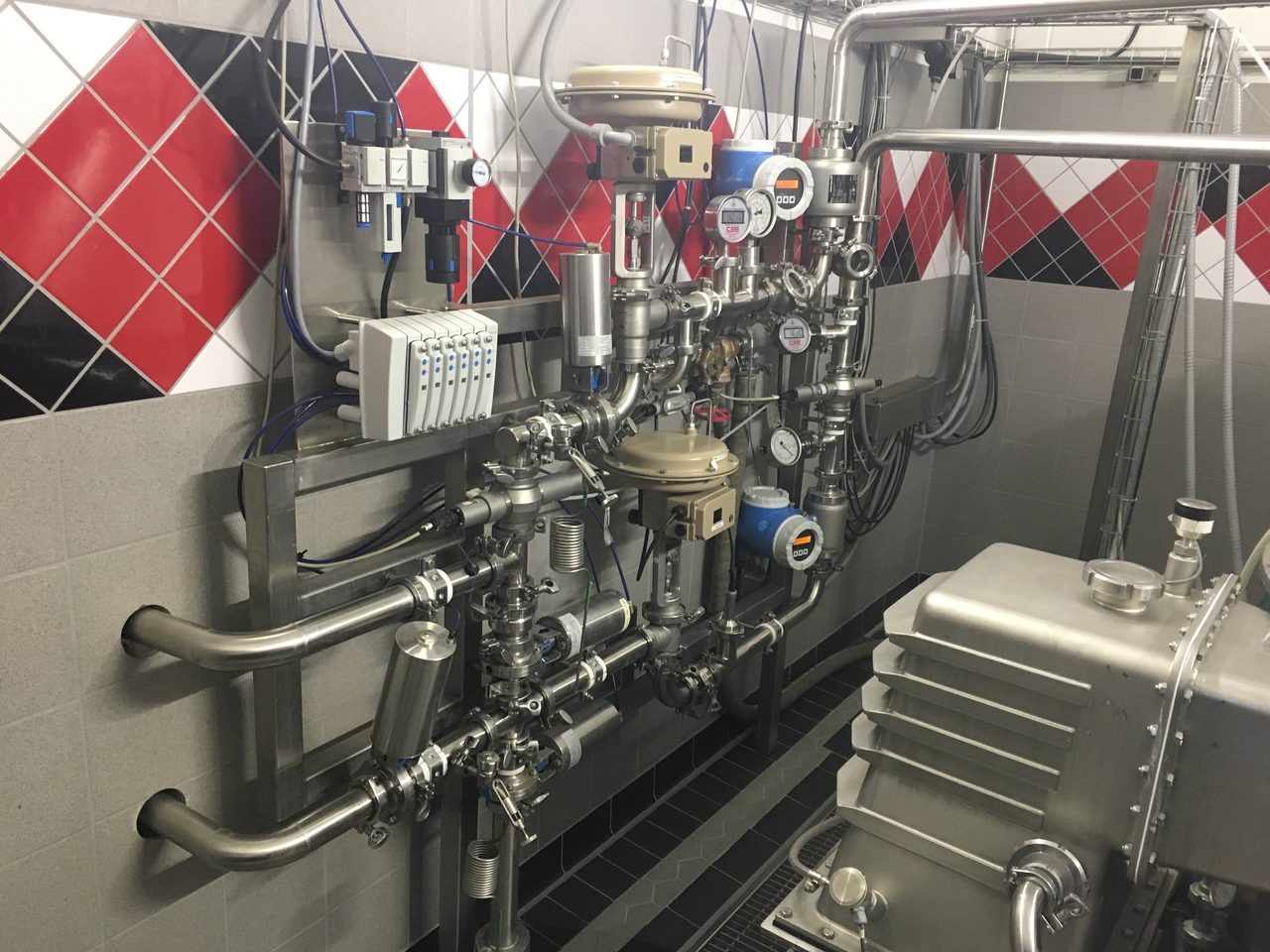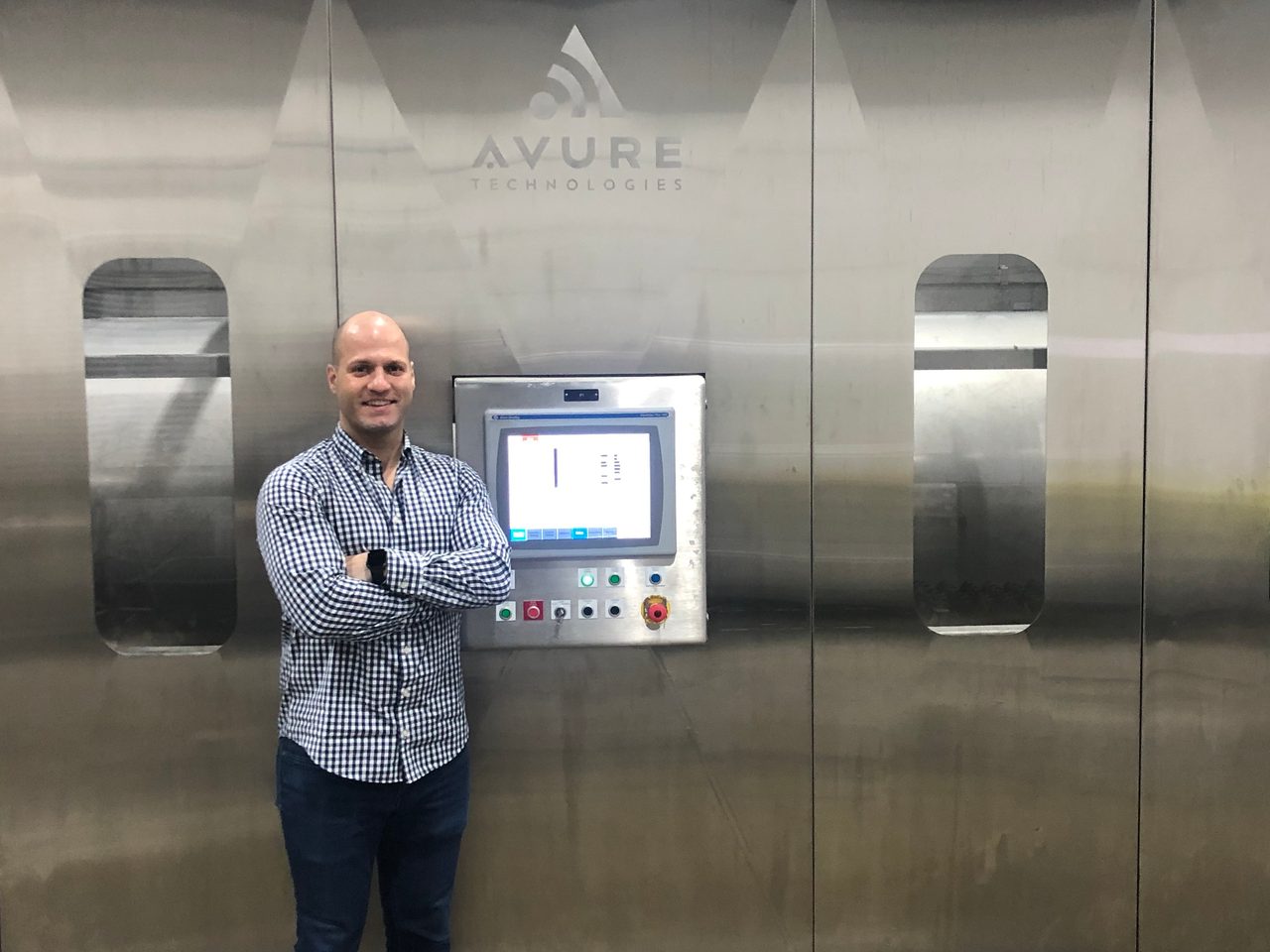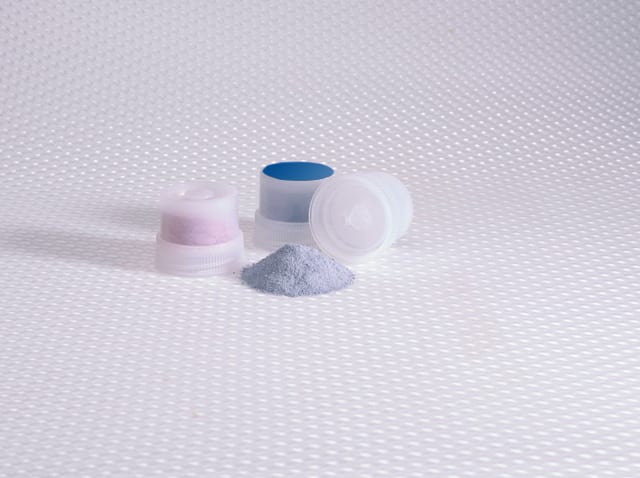Operations
Improving performance through process automation
By Barbara Harfmann
High-pressure processing enhances food safety, extends shelf life
(Image courtesy of Krones)
In the world of supply of demand, if the supply decreases and the demand increases, then prices will go up. For example, during the height of this year’s winter snowstorms, the average cost of a snow thrower was around $650 for a 21-inch, single stage 56 V battery snow thrower kit, and about $2,000, respectively, for a 24-inch cordless two stage self-propelled snow thrower kit with two 7.5Ah batteries or a 30-inch, 306 cc two stage gas snow thrower with electric start.
Within beverage plants, experts suggest that demand for processing automation equipment and parts have heightened as consumer demand for healthier functional beverages is at an all-time high. And with a dwindling labor pool, automation is allowing plants to ensure high levels of productivity and profitability.
Arnold Bros, senior control systems engineer for Krones Process Group North America in Franklin, Wis., notes that some aspects comprise a more efficient beverage plant. He cites Condition Based Monitoring, which is using data analytics to analyze the condition of equipment and help predict when maintenance should be performed.
“This reduces downtime and maintenance cost while increasing equipment lifespan and production capacity,” Bros explains. “Not only does process automation tackle the rising number of SKUs by streamlining the recipe creation process to the end user, but having an intuitive user-friendly batching system speeds up the onboarding process of new employees, due to rapid company growth or other circumstances. Our Krones’ Botech F1 batching technology is an example of this.”
Among the benefits of high-pressure processing are food safety, clean label, enhanced flavor, taste and nutrition, and shelf life extension, Hiperbaric’s Roberto Peregrina says. (Image courtesy of Hiperbaric USA)

Krones’ Senior Control Systems Engineer Nathan Fernando agrees, explaining that increased automation is fostering more reliable and safe manufacturing processes. “Advanced technology, especially sophisticated data collection and reporting, is providing manufacturers with the ability to maximize product yield, minimize downtime and mitigate human error to a degree that was impossible in the past,” he says.
Andres Abreu, business development manager for packaging at Branson Welding and Assembly at Emerson Automation Solutions, notes that today’s customers want a more automated process and extensive data on each weld for traceability as opposed to creating a strong weld that required constant monitoring and mechanical apparatuses to improve control. The programmable logic controller (PLC) fosters communication, optimum process control and repeatability.
The rising number of SKUs and demand for more functional beverages is creating the need for new processing automation equipment that is easy to program and monitor, delivers a higher level of quality, which, in the case of plastic welding, means easy development of a perfect hermetic seal and minimal flash or other weld imperfections, Abreu says.
“With regard to functional beverages, consider the case of a manufacturer producing a ‘mix-to-drink’ beverage in a single, easy-to-use package,” Abreu explains. “To maintain the highest efficacy without the need for refrigeration, the dry nutrients had to remain separated from the liquid in the bottle.”
With consumers seeking healthier, clean-label beverages with more nutrients and less preservatives, the use of fresh, natural ingredients has impacted the way beverages are processed. Innovations in screwcap technology also is changing how these nutrients are dispersed.
The Brookfield, Conn.-based company developed an automated system that uses Branson SW300 servo-driven spin welders to retain the nutrients using a circular thermoplastic seal that is melted and fused to the bottle’s screw cap without impacting the nutrients themselves, Abreu says.
“Advanced technology, especially sophisticated data collection and reporting, is providing manufacturers with the ability to maximize product yield, minimize downtime and mitigate human error to a degree that was impossible in the past.”
— Nathan Fernando, senior control systems engineer at Krones Process Group North America
“The consumer only has to puncture the seal, allow the nutrients to flow into the liquid, mix and drink,” Abreu explains. “Consumer demand for this kind of on-the-go product is skyrocketing, putting pressure on packagers to more fully automate production. Using the Emerson-engineered system, the customer in this case was able to meet its objective of 20 cycles per minute per welder.”
Better performance
Although the attributes that processing automation can provide beverage formulators is driving the market, experts note that size of this equipment can be a deciding factor for decision-makers.
Hygienic tubing, valves and compact components to build smaller processing machines are being sought by original equipment manufacturers (OEMs). Reducing size increases component density, while expanding machine production capability. Even though components are smaller, they have to be equal to or better in performance as compared with larger units, experts note.
When it came time to expand its brewing capacity, Avery Brewing Co., Boulder, Colo., utilized a IP69K-approved MPA-C valve manifold from Islandia, N.Y.-based Festo, enabling the brewery to save floor space and reduce costs because a control cabinet, which is typically used to house pneumatic valves, wasn’t needed. Instead, the MPA-C was simply mounted on the left side of the wall.
Festo Industry Segment Manager Steve Bain points out that OEMs save money when the manifolds are installed closer to the application thereby reducing tubing lengths. Shorter tubing lengths reduce compressed air usage and improve cycle times, which can be important in some applications, he notes.
A IP69K-approved MPA-C valve manifold from Festo mounted on the wall enabled a brewery to save floor space and reduce costs, the company says. (Image courtesy of Avery Brewing Co.)

Another tip Bain suggests for beverage applications is using angle-seat valves for non-hygienic applications because they provide 10 times the life of a ball valve at a similar purchase price.
In its research report “Food & Beverage Processing Equipment Market by Type, Application [including Dairy, Alcoholic and Non-Alcoholic Beverages],” MarketsandMarkets reports that the global food and beverage processing equipment market was estimated at $58.3 billion in 2021, and is projected to reach $76 billion by 2026 at a compound annual growth rate (CAGR) of 5.5%.
This projected growth is being driven by the accelerated demand for dairy products and functional beverages, according to the research firm.
Automation equipment is becoming more flexible and that new adaptability is allowing companies to run different beverages with faster changeover, Mark Maglio says. (Image courtesy of JBTAvure)

“The rapidly growing bakery products, dairy products, and beverages industries are also expected to accelerate the demand for equipment for faster and more efficient processing to meet consumer demand,” the report said. “This growth can be seen in emerging regions such as the Asia Pacific, where, due to progressive economic growth and improved income levels, people are demanding more packaged food and ready meals; this has led to the growth of the overall food and beverage equipment market.”
Expanded growth, expanded opportunities
With consumers’ growing preference toward healthy, functional beverages, beverage manufacturers are adopting new processing equipment designed to churn out more natural and healthier beverages including those that have undergone high-pressure processing (HPP), a non-thermal process that applies high pressurized water to inactive foodborne bacteria, says Roberto Peregrina, director at Miami-based Hiperbaric USA.
Commercially available since the early 1990s, HPP’s benefits include food safety, clean label, enhanced flavor, taste and nutrition, and shelf life extension. “HPP extends the shelf life of juice from three to five days to 60-120 days,” Peregrina says.
Approved by food safety authorities including the Food and Drug Administration, HPP preservation technology for fruits and vegetable juices, energy drinks, teas and coffees meets the high standard requirements of consumers and manufacturers. During the past 10 years, HPP technology has grown exponentially and machinery vendors are launching larger machines reducing total cost of ownership. Currently, about 500 industrial HPP machines are in operation worldwide used by more than 300 companies in 50 countries, Peregrina says.
Founded in 2017 by Alexia Chassagne and Sophie Legros, Paris-based Juste Pressé utilizes Hiperbaric HPP in-bulk technology to produce 100% fruit and vegetable juices. The company’s goal is to offer natural and minimally processed, environmentally friendly HPP juice in PurePak Classic 900-ml and as of 2021, 250-ml carton packaging by ELOPAK, its whitepaper states. “There is no other technology that enables fresh-like juice properties — real taste, vitamins and antioxidants for several weeks,” the founders state.
Emerson developed an automated system that uses Branson SW300 servo-driven spin welders to retain the nutrients using a circular thermoplastic seal that is melted and fused to the bottle’s screw cap without impacting the nutrients themselves, it says. (Image courtesy of Emerson Automation Solutions)

Hiperbaric’s Peregrina notes the two methods to win in HPP — applying industry 4.0 automation in traditional HPP in-pack machines and by using in bulk technology to reduce labor, energy and time.
“Hiperbaric Automation Systems provide cost-efficient and tailor-made solutions to help solve labor issues, product variation, inconsistencies, while boosting production line speed and safety,” he says.
Investing in automation
In an effort to manage costs and ensure availability of natural and plant-based products, beverage manufacturers are looking to automate, says Mark Maglio, CEO and founder of Safety Fresh Foods HPP Toller, a part of JBTAvure’s global tolling network.
The Plymouth, Wis.-based company explains that automation reduces stress on its team members and allows it to maximize production while creating a safe, delicious product for its customers.
Maglio also credits consumer education for its positive impact on the beverage industry.
“Manufacturers are constantly tasked with finding ways to process new ingredients to fulfill the ever-growing demand,” Maglio explains. “In response, automation equipment is becoming much more flexible. From filling lines to juice presses, this new adaptability allows us to run different products of varying shapes and sizes with much faster changeover.”
Krones’ engineers highlight the need for faster, more efficient human machine interfaces (HMIs) that present complete clean-in-place (CIP) information through integrated interfaces viewable on tablets and handheld devices.
Recipes for blending systems resulting in innovative new beverages also are in demand.
“We have seen an increased interest in beverage companies looking for sophisticated recipe-based blending systems that allow recipe creation, scalability, version control tracking and user defined product databases,” explains Kurt Wagner, engineering director at Krones. “… With the demand growing for energy drinks, some of the additional dry ingredients are much more difficult to dissolve in the quantities needed to make the syrup bases for production requirements. This challenge can be overcome with designing the proper powder addition system utilizing high shear incorporation equipment coupled with strategic instrumentation and control strategies.”
Bulk ingredient handling systems can be automated and integrated into the shearing system to reduce the ergonomic issues resulting from the large quantities of the typical smaller size bags that energy ingredients come in, Wagner adds.
Hiperbaric’s Peregrina notes that the future for process automation equipment is bright given its ability to fulfill consumers’ need for healthier, less processed beverages.
“The key to automation equipment is allowing for more beverages to be manufactured more quickly with less human involvement,” Peregrina concludes. “… The shelf-life extension of beverages provided by HPP is invaluable. It allows manufacturers to invest in automation, creating more cost-effective batches of healthy drinks and vastly increasing distribution opportunities to deliver to more consumers.” BI
